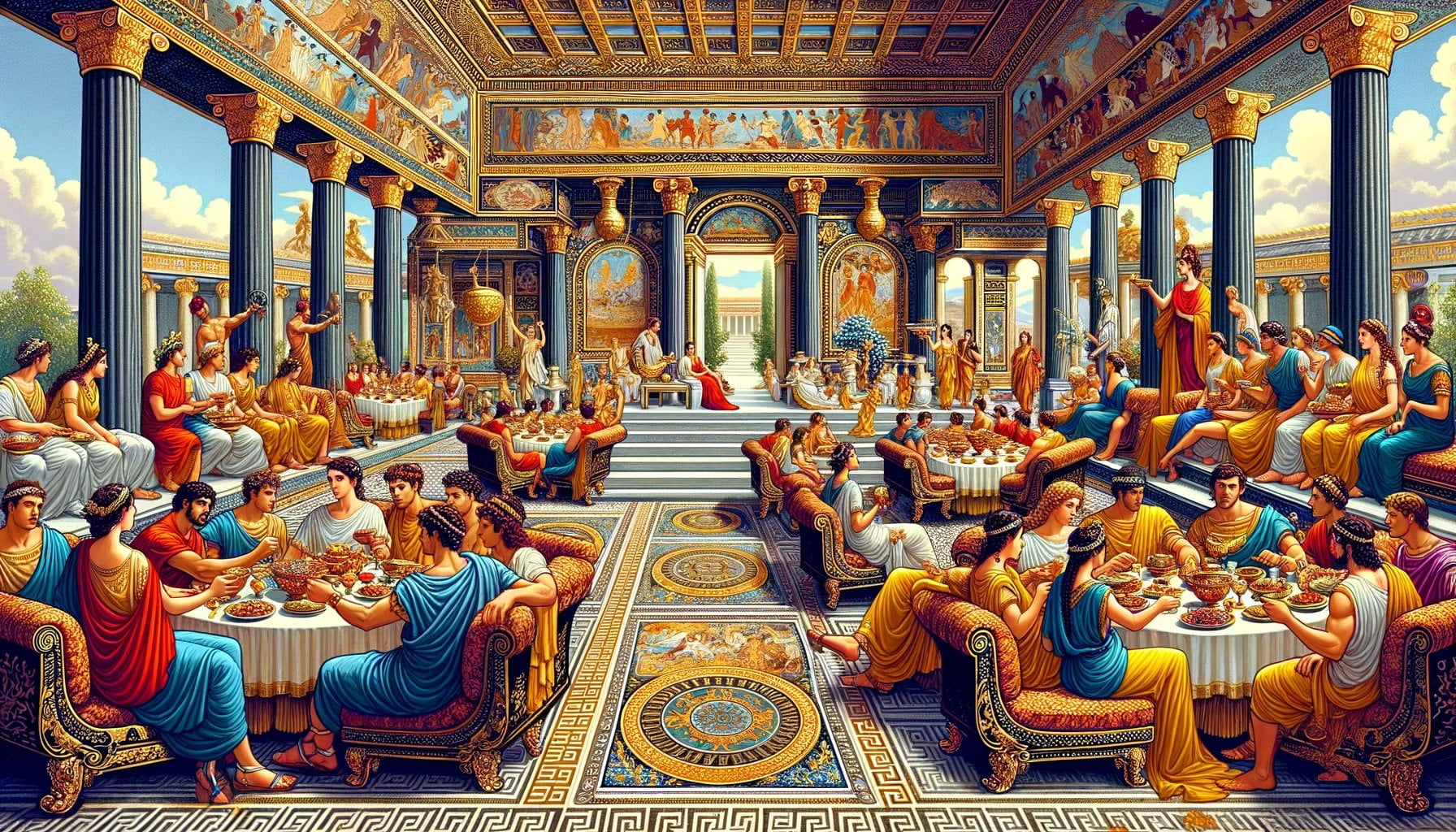Step back in time and uncover the captivating world of the aristocracy in Ancient Greece. In this article, we delve into the lives of the elite, shedding light on their influence and role in shaping the history of this ancient civilization. From their political power to their cultural practices, join us as we unveil the rich and significant contributions made by the aristocracy of Ancient Greece. Discover how these privileged few influenced governance, navigated societal responsibilities, and left an indelible mark on the fabric of this extraordinary era.

Key Takeaways:
- Aristocrats were the “upper class” citizens of Ancient Greece who replaced the monarchy in the polies of Greece.
- They owned most of the land and ruled with a council.
- The concept of aristocracy evolved in Ancient Greece, referring to a system of rule by the best-qualified citizens.
- Aristocracy was contrasted with direct monarchy, where power was held by an individual king.
- The term aristocracy derived from the Greek word aristocrat, meaning “rule of the best.”
- Ancient Greeks, such as Plato and Aristotle, believed that aristocracy was a system where those with intelligence and moral excellence deserved to rule.
- The rights and responsibilities of Ancient Greek aristocrats varied and can be explored further in the source Aristocrats – Rights and Responsibilities.
- The concept of aristocracy in Ancient Greece, its evolution, and contrasts with monarchy can be further understood through the source Ancient Greek Aristocracy.
Aristocracy in Ancient Greece: Unveiling their Influence and Role
In ancient Greece, the aristocracy played a momentous role in shaping the political and social landscape of the time. As the “upper class” citizens, they held significant power and influence, replacing the monarchies that had once governed the Greek city-states. So, what exactly defined aristocracy in ancient Greece, and how did it impact the lives of those involved? Let’s delve deeper into this fascinating subject.
Evolution of Aristocracy in Ancient Greece
The term “aristocracy” derives from the Greek word “aristocrat,” which means “rule of the best.” This underlying concept set aristocracy apart from other forms of government, highlighting the importance of moral excellence and intelligence as qualifications for leadership. In contrast to the direct monarchy where a single ruler holds power, the ancient Greeks relied on councils comprised of notable citizens to govern.
Characteristics and Privileges of Aristocrats
Aristocrats in ancient Greece enjoyed various privileges that set them apart from the rest of society. Foremost among these was their ownership of most of the land, which provided them with wealth and economic power. This allowed them to indulge in luxurious lifestyles, with grand estates and fine possessions symbolizing their high status.
Furthermore, aristocrats had exclusive access to education and cultural opportunities. They were able to refine their knowledge in fields such as philosophy, literature, and the arts, giving them a well-rounded intellectual perspective. This, combined with their noble lineage, further validated their position as the ruling elite.
Responsibilities and Impact on Governance
As members of the aristocracy, individuals were entrusted with significant responsibilities. They formed a crucial part of the ruling councils and played an integral role in decision-making processes. Through their expertise and wisdom, they contributed to the governance and stability of the city-states.
Additionally, aristocrats served as military leaders during times of conflict. Their vast resources allowed them to equip themselves and their troops with the necessary weapons and armor, ensuring that they maintained an advantage on the battlefield. Their valor and strategic prowess were vital in defending the interests of their city-states.
Influence on Cultural Practices
The influence of the aristocracy extended beyond politics and governance. They served as patrons of the arts, providing financial support to poets, playwrights, and philosophers. This allowed these cultural figures to thrive and produce works that would shape the literary and intellectual landscape of ancient Greece.
It is also worth noting that aristocrats played a significant role in religious practices. They held important positions within religious institutions and were responsible for organizing and overseeing various ceremonies and rituals. This further solidified their position as arbiters of social and cultural norms.
The Legacy of the Ancient Greek Aristocracy
The aristocracy of ancient Greece left behind a lasting legacy that continues to fascinate and inform us to this day. Their adherence to the principles of moral excellence and intelligence as prerequisites for leadership laid the groundwork for democratic ideals, which would later emerge in ancient Greece and influence modern governance systems.
Their contributions to literature, philosophy, and the arts left an indelible mark on Western civilization. The works of renowned philosophers such as Plato and Aristotle, who were themselves aristocrats, continue to shape our understanding of ethics, politics, and the pursuit of knowledge.
In conclusion, the aristocracy of ancient Greece played a pivotal role in the development of the Greek city-states. Their intelligence, moral excellence, and wealth allowed them to govern, shape cultural practices, and leave a lasting impact on Western civilization. By examining their privileges, responsibilities, and influence, we can gain a deeper appreciation for the immense contributions made by this influential social class.
Sources:
1. Aristocrats – Rights and Responsibilities
2. Ancient Greek Aristocracy
There were many famous females in ancient Greece, including priestesses, queens, and even enemy warriors. If you’re interested in learning more about these influential women, click here for a captivating journey through history.
Privileges and Responsibilities of the Greek Aristocracy
The aristocracy in Ancient Greece played a significant role in shaping the political and social landscape of the time. As the “upper class” citizens, they replaced the monarchy in the polis and formed the cavalry and hoplites—ancient Greek soldiers—to protect their city-states[^1^].
Privileges of the Greek Aristocracy
The aristocrats enjoyed special privileges in Greek society and the economy. They owned most of the land and ruled with a council, wielding significant power and influence. Power within the Greek city-states was held by large aristocratic geni, or clans[^1^].
Responsibilities of the Greek Aristocracy
However, being aristocrats wasn’t all about privileges. They also had numerous responsibilities. Alongside managing their land, aristocrats sometimes had to oversee the governance of an entire city-state. They were tasked with voicing the citizens’ complaints, although they often neglected this duty due to greed[^2^].
Qualifications to Rule
Aristocrats were considered the most qualified to rule due to their moral and intellectual superiority. They typically inherited their titles and privileges but could also be appointed by a monarch[^3^].
Decline of the Greek Aristocracy
Over time, the aristocracy began to lose their exclusive power and rights as superiority in warfare no longer depended solely on them. The rise of hoplite troops and cavalry shifted the balance of power, leading to a decline in the aristocracy’s influence[^4^].
Key Takeaways:
- Aristocrats in Ancient Greece were the upper class citizens who replaced the monarchy in the polis.
- They enjoyed special privileges, such as owning most of the land and ruling with a council.
- Aristocrats had responsibilities, including managing their land and sometimes overseeing the governance of a city-state.
- They were considered the most qualified to rule due to their moral and intellectual superiority.
- The influence and power of the Greek aristocracy declined with the rise of hoplite troops and cavalry.
Sources:
[^1^] Ancient Greece Facts.com: “Ancient Greek Aristocracy.”
[^2^] History Disclosure: “Who Were the Aristocrats of Ancient Greece?”
Social Interactions and Cultural Practices of Aristocrats
In ancient Greece, the aristocracy held a position of power and influence within society. They were part of the highest social class, known as the aristoi, and their wealth and status afforded them certain privileges and responsibilities. The aristocrats played a significant role in shaping the culture and social interactions of ancient Greek society.
The Influence of Aristocratic Values and Practices
One of the ways in which the aristocracy influenced Greek culture was through their participation in symposia. Symposia were social gatherings where aristocrats gathered to discuss various topics, engage in philosophical debates, and appreciate the arts. These events allowed aristocrats to showcase their wealth and cultural refinement, while also providing opportunities for networking and establishing social connections.
Privileges and Responsibilities of the Aristocracy
The aristocracy enjoyed exclusive access to education and cultural opportunities, which allowed them to refine their knowledge in various fields. This education played a crucial role in nurturing their moral and intellectual superiority, which was considered a qualification for leadership. Additionally, aristocrats owned most of the land and occupied important positions within religious institutions. They were responsible for managing their land and overseeing the governance of city-states, contributing to the stability and functioning of the society.
Social Interactions of Aristocrats
Aristocrats engaged in social interactions primarily within their own social class. They attended symposia, where they engaged in intellectual debates, listened to poetry recitals, and enjoyed performances by musicians and dancers. These gatherings were not only a means of socializing but also an opportunity for the aristocrats to display their wealth and cultural refinement.
Cultural Practices of Aristocrats
The aristocrats were patrons of the arts, providing financial support to poets, playwrights, and philosophers. Their patronage helped spur the development of literature, drama, and philosophy in ancient Greece. The aristocracy also organized various ceremonies and rituals within religious institutions, further cementing their social status and influence.
Key Takeaways:
- Aristocrats in ancient Greece were part of the highest social class known as the aristoi.
- The aristocracy influenced Greek culture through their participation in symposia and their support of the arts.
- Aristocrats enjoyed exclusive access to education and cultural opportunities, contributing to their moral and intellectual superiority.
- They had responsibilities such as managing land and overseeing the governance of city-states.
- Aristocrats primarily interacted with others from their own social class and engaged in intellectual debates and cultural performances.
Sources:
– Wiley Online Library
– World History Encyclopedia
Impact of Aristocracy on Greek Governance and Politics
As an experienced historian specializing in ancient civilizations, I have delved deep into the aristocracy of Ancient Greece. The aristocracy played a significant role in shaping the political and social landscape of the time. Let’s explore the impact of the aristocracy on Greek governance and politics.
Understanding Aristocracy in Ancient Greece
In most Greek states during the eighth and seventh centuries BCE, aristocracy emerged as a dominant form of government, replacing monarchy. Aristotle, the renowned Greek philosopher, believed that exclusive groups of noble families formed an aristocracy. This form of government involved rule by a privileged group of leading citizens who held significant power and influence.
Privileges, Responsibilities, and Influence of Aristocrats
As members of the aristocracy, individuals enjoyed various privileges and responsibilities. They owned most of the land, possessed vast wealth, and led luxurious lives. Aristocrats held power and influence over the governance of the city-states. They served on ruling councils, contributing to the stability and governance of their respective regions.
During times of conflict, aristocrats assumed military leadership roles. Their wealth allowed them to equip themselves and provide for their troops. Additionally, they played a crucial role in fostering the cultural and intellectual development of ancient Greece. By supporting poets, playwrights, and philosophers, aristocrats became patrons of the arts, contributing significantly to Greek culture.
Influence on Governance and Politics
The aristocracy wielded considerable political power. They often formed hereditary governments, with hereditary monarchs appointing officers. This created a system where power was concentrated in the hands of a select group of families. These families, known as the aristoi, were considered the most qualified to rule due to their moral and intellectual superiority.
Their influence extended beyond politics. Aristocrats held important positions within religious institutions, organizing ceremonies and rituals. They actively participated in symposia, engaging in intellectual debates, and appreciating the arts. This active engagement played a pivotal role in shaping Greek governance and politics.
The Legacy of the Ancient Greek Aristocracy
The ancient Greek aristocracy left a profound impact on Greek society. Their contributions set the foundations for democratic ideals and significantly influenced literature, philosophy, and the arts. The legacy of the aristocracy continues to resonate in modern governance systems, shaping our understanding of ethics, politics, and knowledge.
Key Takeaways:
- Aristocracy emerged as a dominant form of government, replacing monarchy in most Greek states.
- Aristocrats belonged to a privileged group of leading citizens, enjoying wealth and power.
- They held crucial positions in governance, serving on ruling councils and contributing to stability.
- Aristocrats assumed military leadership roles during times of conflict, equipping themselves and their troops.
- They were patrons of the arts, supporting poets, playwrights, and philosophers.
- The aristocracy significantly influenced Greek governance and politics, leaving a lasting legacy.
Sources:
– Stanford Encyclopedia of Philosophy

FAQ
Q1: What was the role of aristocrats in Ancient Greece?
A1: Aristocrats in Ancient Greece replaced the monarchy and formed the upper class of society. They owned most of the land, ruled with a council, and formed the cavalry and hoplites to protect their city-states.
Q2: What were the privileges of the Ancient Greek aristocracy?
A2: The Ancient Greek aristocrats enjoyed special privileges in society and the economy. They owned most of the land and held power within the Greek city-states. They were part of large aristocratic clans known as geni.
Q3: What were the responsibilities of the Ancient Greek aristocracy?
A3: The Ancient Greek aristocrats had several responsibilities. They managed their land and sometimes even had to manage an entire city-state. They also had the duty to voice the complaints of the citizens, although they often neglected this responsibility due to greed.
Q4: How were the Ancient Greek aristocrats qualified to rule?
A4: The Ancient Greek aristocrats were considered the most qualified to rule due to their moral and intellectual superiority. They typically inherited their titles and privileges, but could also be appointed by a monarch.
Q5: What led to the decline of the Ancient Greek aristocracy?
A5: The decline of the Ancient Greek aristocracy began when superiority in warfare shifted from the aristocrats to hoplite troops and cavalry. As a result, the aristocrats started losing their exclusive power and rights.
- Crypto Quotes’ Red Flags: Avoid Costly Mistakes - June 30, 2025
- Unlock Inspirational Crypto Quotes: Future Predictions - June 30, 2025
- Famous Bitcoin Quotes: A Deep Dive into Crypto’s History - June 30, 2025
















